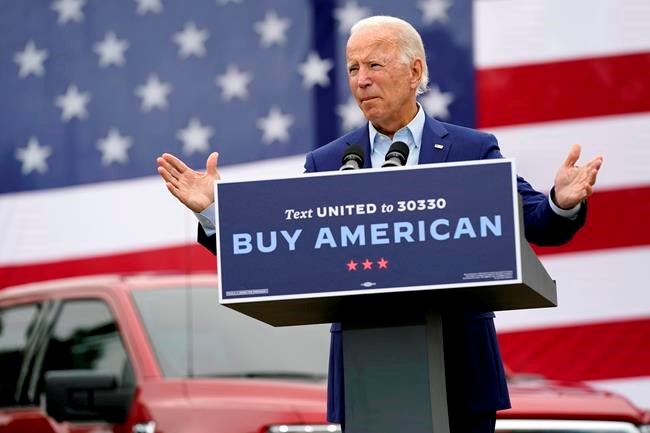Canadian companies that bid on American government contracts could be cut out of the procurement process if Joe Biden follows through on his Buy American plan after he becomes U.S. president today, according to business and trade experts.
Manufacturers and exporters in Canada supply a vast range of equipment to public works projects in the U.S. from school buildings to wastewater treatment facilities.
But Biden’s promise to prioritize U.S.-based suppliers and products made on American soil could hurt Canadian companies by blocking them from bidding for work, especially after he unveils an infrastructure plan next month.
The Made-in-America endeavour could disrupt the Canada-U.S. supply chain and lead to significant trade tensions, experts say.
Yet the hardest hit firms will be those directly involved in U.S. government contracts, they say.
“If you're in the business of supplying government procurement projects like municipal infrastructure, those are the companies most at risk,” said Dennis Darby, president and CEO of the Canadian Manufacturers and Exporters.
Stricter Buy American rules for federal procurement could hurt manufacturing on both sides of the border, he said.
“Manufacturers are so integrated across North America,” Darby said, noting that a lot of what Canadian companies make are the “bits and pieces” that go into the continental supply chain.
“When U.S. manufacturers do well, so do Canadian manufacturers. We’re all part of the same supply chain.”
The biggest losers in an era of greater U.S. protectionism are likely to be a broad cross-section of Canadian firms supplying products to American municipalities, rather than specific sectors, experts say.
Companies that supply pumping equipment for municipal water facilities, pipes for new sewage lines, or play structures for new playgrounds could all suffer, they say.
Meanwhile, both Canada the U.S. already have “buy national” provisions carved out of existing trade agreements. Military procurements, for example, exclude foreign suppliers.
Donald Trump pursued his own Buy American policies but it’s unclear how much further Biden can expand these provisions without facing a legal challenge, said trade expert Lawrence Herman.
“The question will be whether the expansion of the Buy American provision is permissible within the scope of the (World Trade Organization) agreement," said Herman, international trade lawyer at Herman and Associates.
Yet the impact of the Buy American agenda on Canadian businesses could be widespread, he said.
“There are a lot of Canadian companies that supply products to American municipalities,” Herman said. “They could all be affected.”
Colin Robertson, one of the negotiators of the original Canada-U.S. Free Trade Agreement and North American Free Trade Agreement, said Canada should come to the table with solutions.
“If Biden goes through with this, you're going to hear from Canadian companies that feel they're being excluded from U.S. projects,” said Robertson, vice-president and fellow at the Canadian Global Affairs Institute.
“You’re almost better to deal with it on a one-by-one basis,” said the former Canadian diplomat. “If the guy who builds playsets in Ontario can’t bid on a new playground, what you want to do is try and get the province and state to work something out.”
If Biden’s massive stimulus package is approved, the demand for construction materials – especially steel and aluminum – could be huge, Robertson said.
But if the Buy American plan is ramped up and starts to affect materials from Canada, he said negotiators need to point out that ultimately they’ll get better value including materials produced in Canada.
“If you want maximum value for these dollars, it’s better to open up bidding,” Robertson said. “The challenge with these sorts of Buy American programs is you can get cartels forming within your locality that drive up prices.”
This report by The Canadian Press was first published Jan. 20, 2021.
Brett Bundale, The Canadian Press


